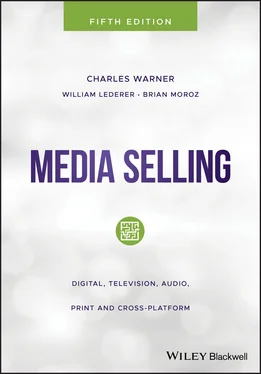Prior to the debilitating recession that hit America in 2008 as a result of the subprime mortgage meltdown, solution selling had been the preferred approach used by enterprise, or business‐to‐business (B2B), selling, which includes media selling. The fourth edition of Media Selling , published in 2009, espoused a solutions‐based approach. However, the research of Dixon and Adamson showed that several trends had reduced the effectiveness of solution selling:
1 The customer burden of solutions
2 The rise of the consensus‐based sale
3 Increased risk aversion
4 Greater demand for customization
These trends identified by authors of The Challenger Sale also broadly apply to selling media.
The customer burden of solutions
Solution selling requires a deep understanding of a customer’s business, customer problems and challenges, customer strategy, and a customer’s competitors, all of which require asking customers a lot of questions. This process of discovery and investigation consumes a great deal of a customer’s time, which business customers are less and less willing to give. Furthermore, in the age of Internet disruption, many customers are unaware of some of their more pressing problems and especially of the opportunities available in digital media.
Also, advertising agencies purchase the majority of national media advertising by using a highly formalized request‐for‐proposal (RFP) process, although because of programmatic buying, the use of RFPs is declining. You can see examples of RFPs at http://mediaselling.us/downloads.html. Agencies email RFPs to media salespeople and expect proposed schedules emailed back that meet the criteria specified in the RFPs. Face‐to‐face selling is kept to a minimum because of the vast number of media outlets, and only salespeople from large media brands such as Google, Facebook, ABC, CBS, FOX, NBC, ESPN, BuzzFeed, Huff Post, or Snapchat, for example, can get personal selling time with major agency buyers and planners, who are neither interested in nor have time for solutions‐based selling approaches; they only want to know the price, the medium’s ability to deliver impressions to a specific target audience, the social‐media support a schedule will be given, the appropriateness of the content, and the responsive service they will get. Effectively selling media to agencies requires conversations with agency planners and buyers before an RFP is crafted in order to affect the scope of the RFP so that it favors in some way the medium being sold. On the other hand, if a buy is being made programmatically and no RFP is going to be issued, effective selling to agencies requires educating the agency planners and buyers on the benefits of your medium so they will consider putting it in a media plan and buying it.
Local businesses that place ads in media, such as on radio and television stations or in local newspapers and magazines, are typically interested in solutions to their marketing problems and, thus, are willing to take the time to share information about their businesses with salespeople. Local advertisers will usually answer discovery questions and will be grateful for help in crafting solutions to their marketing problems and in navigating a complex and fragmented media environment.
John Zimmer and his brother, Don, own the Zimmer Radio and Marketing Group in the Columbia‐Jefferson City, MO market. The group consists of nine radio stations, three magazines, creative services, website design and development, logo design, digital promotion, social media, print design, and jingle production – a complete integrated marketing communications offering. The Zimmer Group has 20 salespeople who are trained to assess the marketing and advertising needs of local businesses and propose integrated, cross‐platform solutions, including being an advertising agency that plans and buys digital media, primarily Google and Facebook, in addition to placing radio, television, and magazine schedules.
The salespeople for the American‐Statesman newspaper in Austin, TX, also sell on a cross‐platform basis. Over 20 percent of the American‐Statesman’s total revenue comes from the digital edition of the paper and from two other websites, Austin 360, a things‐to‐do website and Ahora Si!, a Spanish‐language version of the newspaper. The American‐Statesman also offers an advertising agency service to its clients, similar to what the Zimmer Radio and Marketing Group offers.
These two media companies are bucking a trend of local radio and newspaper advertising revenue decline by offering cross‐platform, full‐service solutions to local advertisers. The Zimmer Radio and Marketing Group and the Austin American‐Statesman are partnering with local businesses and helping both themselves and their partners grow.
The rise of the consensus‐based sale
As the media have fragmented and buying so many media alternatives has become more complex, the need for consensus to get big media deals done has increased. A major shift in media placement strategy, for example moving significant ad dollars out of broadcast television or radio and placing it in digital media, is a decision that a chief marketing officer (CMO) is often not willing to make alone or without input from multiple sources, including the company’s CEO. Dixon and Adamson’s research for The Challenger Sale indicated that widespread support for a supplier across a decision‐maker’s team is the number‐one thing senior executives look for in making a purchase decision. 11
This need for consensus requires that for major media investments salespeople must call on and persuade multiple levels of client and agency personnel, which, of course, means an investment of a great deal of time and effort. This need for consensus also means that salespeople should be adept at and comfortable with establishing and maintaining relationships at multiple client and agency levels if the situation calls for it.
According to Dixon and Adamson, “As deals have become more complex and more expensive, most customers are much more concerned about whether they’ll ever see a return on their investment.” 12 This general increase in risk aversion applies to the media, especially to buying programmatically, which is quite confusing to many marketers. Thus, in a risk‐averse environment, media sellers need to establish a high level of trust in order to mitigate their clients’ fear of uncertainty and of making a mistake. For example, on a national basis, even though a large advertiser, such as AT&T or its advertising agency, could buy Google keywords such as “mobile phone service” on the Google Ads (formerly AdWords) self‐serve auction platform, Google has a sales team that handles the AT&T buying of keywords.
On a local basis, many media outlets such as the Zimmer Radio and Marketing Group and the Austin American‐Statesman are partnering with clients and delivering full‐service ad agency buying, designing, creative, and optimization functions in order to reduce their client’s apprehension in placing cross‐platform advertising.
Greater demand for customization
A one‐size‐fits‐all solution is no longer a viable approach to selling in general, and particularly in the media. When selling media, every advertiser wants to feel special and that they are not only different from other businesses but especially different from their competitors. An offer for each customer must be customized according to the client’s unique business goals and strategies and framed according to the unique personality of the decision‐making individual.
Читать дальше












